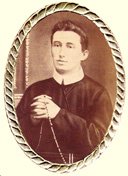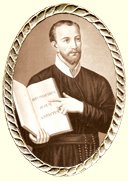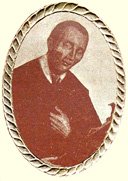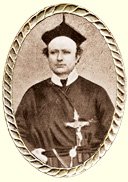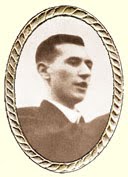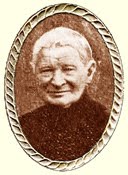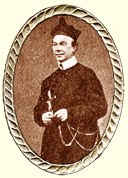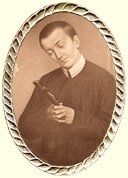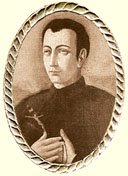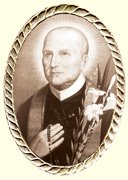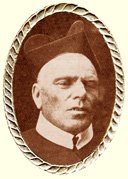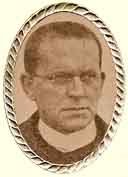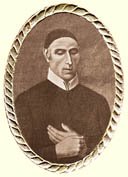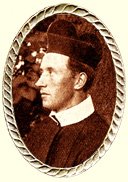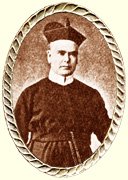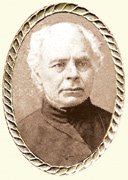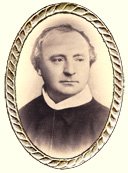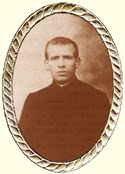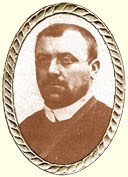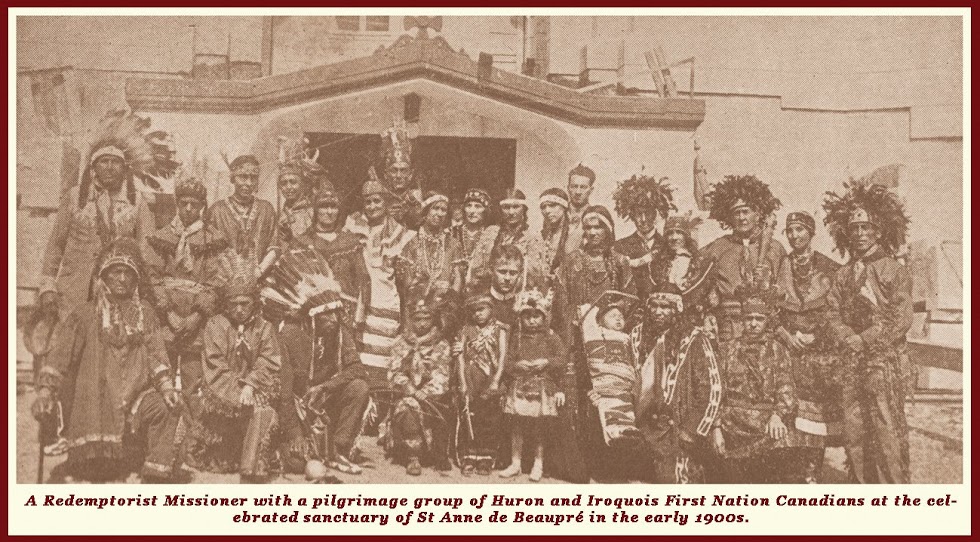No greater love hath man than this…John-Nicholas Bakker was born in Sloosten, near Amsterdam, Holland, on the 25th of March 1833. This holy religious could hardly have foreseen his destiny: but who can guess the decrees of Providence? For Providence alone is able to turn the humblest son of men into a monk, a priest, a hero.
After joining the Congregation of the Most Holy Redeemer in 1857 as a coadjutor brother, John Bakker took his religious vows in 1860. He had wished to be, as he said, a true religious, i.e. someone who does not care for his own comfort, and to joyfully go wherever obedience would have him. His wish was soon fulfilled, as the Surinam Mission had just been accepted by the Dutch Redemptorists, and the new Brother was sent there after a few years in Amsterdam.
He landed on the 24th of November 1866, together with two other coadjutor brothers, Br Baptist and Br Francis, in Paramaribo, and it is in this town that he spent the first nine years of his stay overseas. Then in 1875, Mgr Swinkels, the apostolic delegate for Surinam and Superior of the Paramanibo community, founded an orphanage for boys in Livorno.
Brother John was immediately designated for this important but demanding foundation. "I never thought," he said in a later note, "that I would one day look after these poor Surinamese children. But how often, thinking of their material and moral misery, have I asked God that they should be relieved!" Such relief was finally given, and Brother John soon acquired the main responsibility for managing the orphanage, and he was naturally given the name of the orphans Father.
Those sacrifices were great, for it was a ceaseless effort. To get up as early as four in the morning, and to end one's laborious day at ten thirty at night: such was the monotonous, albeit diversely fruitful path along which the good Brother's life was shaped. "It's a bit harsh," he sometimes said laughingly, "but at the end of the day, the suffering is only ours."
Sublime words indeed that show the generosity of this great heart! But yet, how much he loved his dear orphans! They were his whole life. "If I were offered the choice," he wrote once to the Very Reverend Provincial Father of Holland, "to live for something else but God, that would be for the Surinam orphans." This is why their playfulness was unable to undermine his patience. "These children play a lot of tricks on me," he said, "and not always the kindest ones, either. But all in all, they are good boys."
But who could tell of all the sacrifices he had to endure on a daily basis? Brother John's charity, patience, amiability never fainted. However, the good religious man's solidity of judgement and eminent virtues had inspired his superiors to make a resolution: he would be prepared to receive the holy orders.
Thus he started studying Latin, then theology and in 1885, Mgr Schaap, Mgr Swinkels' successor, conferred priesthood to this worthy son of Saint Alfonsus. At the same time, he sent him to the rescue of the lepers' hospital in Batavia. All the graces attached to the sacrament of the order would be needed to help Father Bakker bear the cross that was awaiting him there.
"I am convinced," Saint Teresa says somewhere, "that the measure of our strength for suffering is the measure of our love. A great love bears great crosses, while a small love only bears little ones." If these words are true (and who would deny that they are), divine love must have raged within the brave missionary's heart, whose life we are sketching here.

One day, at Batavia's hospital, a poor soul was about to die. Full of remorse, he declared that he had poisoned several persons. He had also succeeded, he said, in having Fr Bakker take a slow acting poison, as a revenge for a blame that Father had cast on somebody's work. Hence the leprosy that the religious man was currently suffering.
This terrible confession was unfortunately true! Some dreadful symptoms soon revealed to the holy religious that he was indeed affected by the terrible disease. Everything became a nightmare to him: walking, sitting down, standing up, all meant agony. A continuous, excruciating pain attacked his bone marrow, and the sensibility of his limbs was such that the most insignificant contact triggered the most atrocious suffering. In addition, an obscure feeling of weariness and ponderosity in the legs brought his pains to their extreme.
Who can tell of Fr Bakker's anxiety, and with what terror he would follow, over many years, the progress of the disease that was mining him? But he had perfect resignation. "To suffer," he wrote in 1886, "this is my lot henceforth. Yet, I am happy. This illness is a gift of God, and while you never get accustomed to the inner feeling of being rejected from society and feared by your neighbours, such a vivid pain is still part of God's will: therefore, it is also part of mine."
His humility was no less moving. "I have indeed deserved it and more," he wrote, "I am in no doubt about this, and until now I have born my cross lovingly. My main concern is that I can not work anymore, and being very much like the fifth-wheel of a car." Who would not admire such a sublime feeling in a man who had devoted himself entirely to the salvation of these poor lepers?
Apparently, one of the saddest effects of leprosy is the selfishness it provokes among its victims. Fr Bakker did not suffer such misery. Thus, God seemed to show how his divine hand somehow softened the stroke that was given. Never did the holy religious man cease to give thanks to his benefactors, his superiors, and his congregation as a whole! How thankfully he remembered the gifts that had been made to his poor orphans, to the lepers he lived with! With what zeal he prayed and had others pray for the contributors to his work! He also bore his superiors continuously in his mind, and for them he would at once climb up to God. "With all I have received," he would write them, "how may I even think about sufferings? In Heaven, we shall forget everything we call suffering down here." He also said once: "The question remains - what shall I return to the Lord for all He has given to me ? All I can give to God is myself, and I shall do my best to give myself to Him with a thankful heart."
A letter for the new year sent to the Very Reverend Provincial Father of Holland brings even more light on the inner feelings of such a noble heart. "My Most Reverend Father," he told him, "let me wish you a very happy new year together with my most humble thanks for all the good which I hold, God permitting, from your Reverend. And since you know my limitations, I am confident you will not find me indiscreet to beg for your intercession towards the Most Reverend Father General. I know of no other way to show how thankful I am but by observing my Rules in as much as my disease permits me, and by providing all the help, however insignificant, that I am able to provide - and then, by suffering with love - yes, hopefully, with love!"
A huge consolation had, until 1888, supported Father Bakker in his terrible trial. By the end of that year, however, it was taken away from him. His fingers had to be amputated after being attacked by the leprosy, which prevented him from then on from celebrating the holy sacrifice of mass. Three years of helplessness went by in these conditions, three horrendous years from a natural point of view, yet sanctified by the most sublime resignation. "Fr Bakker," a fair judge in terms of devotion wrote, "seems to forget his own pains so as to concentrate on those of others. Before I left for Europe, I asked him if he longed for any sort of relief, whether or not I could do something for him? – 'No, Your Excellence,' he answered, 'I don't need anything. But be generous with our poor lepers.' And the old prelate added with much reason, 'I take him as a saint, and I think he is one indeed.'"
In August 1890, Father Bakker's pains increased considerably. A violent oppression and evil fevers were added to his sufferings without altering his unshakable patience. On August 23rd, knowing he had come to the end, he called one of his fellow priests and told him: "Father, would you please give me the last rites, since I am going to die shortly." He received the sacraments with astonishing devotion and, as he was asked whether he wished something special to be told to his superiors or to his family, he said, "Oh, no! But make sure my superiors, and in particular His Eminence, are thanked for all the good things I received from them in the Congregation." Then he added in a whisper, "I have always lived for the Congregation, and now I die for it."
Then, he begged for forgiveness from all his fellow priests and brothers in the various houses for all the trouble he had possibly caused them, and he expressed his desire that his death should be announced to his relatives. On August 26th, he communicated for the last time. He entered his agony in the afternoon, but all of a sudden, he came back to reason for a short while: "Oh!" he said, "How much I long for Heaven!" And then he died. It was half past nine in the evening.
Father John-Nicolas Bakker was 57 years old. He had spent 35 years in the Congregation of the Most Holy Redeemer, including 24 in Surinam and 7 in the lepers institution of Batavia.
Travellers visiting Batavia's cemetery may see there, at the foot of a great mission cross, surrounded by five thin palm trees, three tombs marked by crosses, forever worth of our veneration: that of Blessed Father Peter Donders, that of a secular priest, Fr Hémink, who also sacrificed his life for numerous lepers, and finally that of Fr Bakker. Tears come to the eyes at the thought of these obscure and sublime devotions, which only the Catholic religion is able to generate; but who could think, without an equally profound joy, of the wonderful crown that is the reward of such admirable virtues? †
 We find him a member of the Community at Limerick, Ireland, towards the end of 1876, and he continued to take part in the Missions given from this house until the close of the year 1880, when he was transferred to Bishop Eton; the chronicles add: “to the great regret of his confreres at Limerick.” He was not again attached to the Limerick house, though he often worked afterwards on the Irish Missions.
We find him a member of the Community at Limerick, Ireland, towards the end of 1876, and he continued to take part in the Missions given from this house until the close of the year 1880, when he was transferred to Bishop Eton; the chronicles add: “to the great regret of his confreres at Limerick.” He was not again attached to the Limerick house, though he often worked afterwards on the Irish Missions.






















 More than 100 priests and some 15,000 Liverpudlians were present. The 70 strong Greek Catholic choir from Manchester sang during this Pontifical Liturgy. Archbishop Downey delivered a moving sermon about the variety of Rites in the Catholic Church and the beauty of the Eastern Rite.
More than 100 priests and some 15,000 Liverpudlians were present. The 70 strong Greek Catholic choir from Manchester sang during this Pontifical Liturgy. Archbishop Downey delivered a moving sermon about the variety of Rites in the Catholic Church and the beauty of the Eastern Rite.








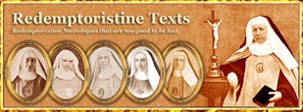
.jpg)









